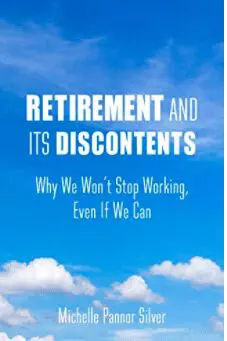(Subtitle: Why We Won’t Stop Working Even If We Can)
by Michelle Pannor Silver (2018 – Columbia University Press)
Book Review by Joe Casey
“Retirement’s freedom can create challenges for people who’s life’s work was closely associated with their sense of self-worth.”
Transitioning to retirement can be challenging. But it’s even more so for some people. Some experience boredom in retirement. Others may fall into depression in retirement. Books on adjusting to retirement can be helpful in preparing for retirement, but they don’t typically address people who love their work. Michelle Pannor Silver delves deeply into the experience of retirement for people whose identities are closely linked with their work. She provides a window into the lived experiences of different people’s transitions to retirement and the challenges and opportunities that emerge. The book paints a portrait of retirement that is complex and emotionally nuanced, at both an individual and societal level. For example, she highlights the cost of ageism that’s robbing organizations and communities of experienced human capital with much more to contribute.
Will the Timing of Your Retirement Be Up to You?
Retirement and Its Discontents is based on original research and is also realistic, accessible and relatable. A fascinating aspect of this book is Silver’s interviews with people from five different occupations: CEOs; elite athletes; professors; physicians; and homemakers. While the people interviewed are from very different walks of life, what they have in common is the degree to which their sense of self-worth is derived from what they do. Upon retirement, their identity is in flux. Their different occupations have different norms and triggers on the timing of retirement. What is clear is the significant role that institutions play in influencing when someone retires. While we may think about when someone wants to retire, the timing is not always up to the person.
Takeaways
Silver illustrates how retirement can mean different things to different people – it’s heaven to some and can be seen as a living hell to others. This book underscores the critical role that identity can play in transitioning to life in retirement and how important it is to be thoughtful in planning your transition. The more central a role that work plays in a person’s life, the more attention will need to be paid to replacing some of the psychological and social benefits derived from work.
Silver makes a compelling case that retirement is far more complex than many may think. She also emphasizes that retirement is a social phenomenon. This book illustrates that there are many different pathways to retirement. If you love your work (or someone you care about does), this book can be a valuable resource in preparing for the challenges of transitioning to retirement.
Retirement and Its Discontents on Amazon
Listen to our conversation with the author on The Retirement Wisdom podcast

